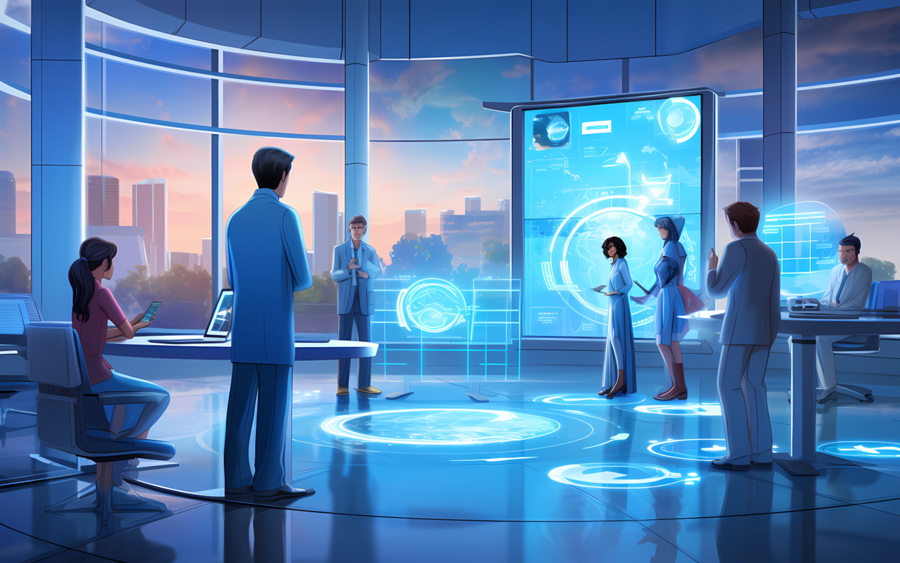The digital landscape is constantly evolving, and digital agencies must stay ahead of the curve to remain competitive and effective. As technology advances and consumer behaviors shift, the future of digital agencies will be shaped by several key trends and innovations. Here’s what to expect in the future of the digital agencies business:
1. Increased Emphasis on Data-Driven Strategies
Data will continue to play a pivotal role in shaping digital marketing strategies. Future digital agencies will place even greater emphasis on collecting, analyzing, and leveraging data to make informed decisions. Advanced analytics and artificial intelligence (AI) will enable agencies to gain deeper insights into consumer behavior, optimize campaigns in real-time, and deliver personalized experiences.
2. Greater Focus on Personalization
As consumers demand more personalized experiences, digital agencies will need to adopt strategies that cater to individual preferences and behaviors. Personalization will go beyond basic segmentation, with agencies using AI and machine learning to deliver highly tailored content, recommendations, and advertisements. This will enhance customer engagement and drive better conversion rates.
3. Integration of Emerging Technologies
Emerging technologies such as augmented reality (AR), virtual reality (VR), and blockchain will become integral to digital marketing strategies. Agencies will use AR and VR to create immersive brand experiences and enhance customer interactions. Blockchain technology will be employed to ensure transparency, security, and authenticity in digital advertising and transactions.
4. Expansion of Voice Search Optimization
With the growing popularity of voice-activated devices, optimizing for voice search will be crucial. Future digital agencies will focus on creating content that is easily discoverable through voice search. This will involve understanding natural language processing (NLP) and optimizing for conversational queries to ensure brands remain visible in voice search results.
5. Rise of Omnichannel Marketing
Consumers interact with brands across multiple channels, and future digital agencies will prioritize creating seamless omnichannel experiences. This approach will ensure consistent messaging and branding across all touchpoints, from social media and email to websites and physical stores. Integration and coordination of marketing efforts will be key to delivering a cohesive customer journey.
6. Ethical and Transparent Marketing Practices
As consumers become more conscious of privacy and data security, ethical marketing practices will gain prominence. Future digital agencies will need to prioritize transparency, ensuring that data collection and usage are conducted ethically. Building trust with consumers through honest and transparent marketing practices will be essential for long-term success.
7. Increased Collaboration and Integration
Collaboration between digital agencies and other business functions will become more integrated. Agencies will work closely with clients’ internal teams, including sales, customer service, and product development, to create holistic strategies that align with overall business goals. This integrated approach will ensure that all aspects of the business contribute to a cohesive digital strategy.
8. Focus on Sustainability and Social Responsibility
Sustainability and social responsibility will become key considerations for digital agencies. As consumers increasingly support brands that prioritize environmental and social issues, agencies will need to develop strategies that align with these values. This may include promoting eco-friendly practices, supporting social causes, and ensuring that marketing efforts reflect a commitment to sustainability.
9. Continuous Adaptation and Learning
The rapid pace of technological advancement and changing consumer behaviors will require digital agencies to continuously adapt and learn. Agencies will need to invest in ongoing training and development to keep their teams updated with the latest trends, tools, and techniques. Staying agile and open to innovation will be crucial for staying relevant and competitive.
Conclusion
The future of digital agencies will be shaped by advancements in technology, evolving consumer expectations, and a greater emphasis on ethical and personalized marketing practices. By embracing these changes and staying ahead of emerging trends, digital agencies can continue to deliver effective strategies and drive business success in an ever-changing digital landscape.






